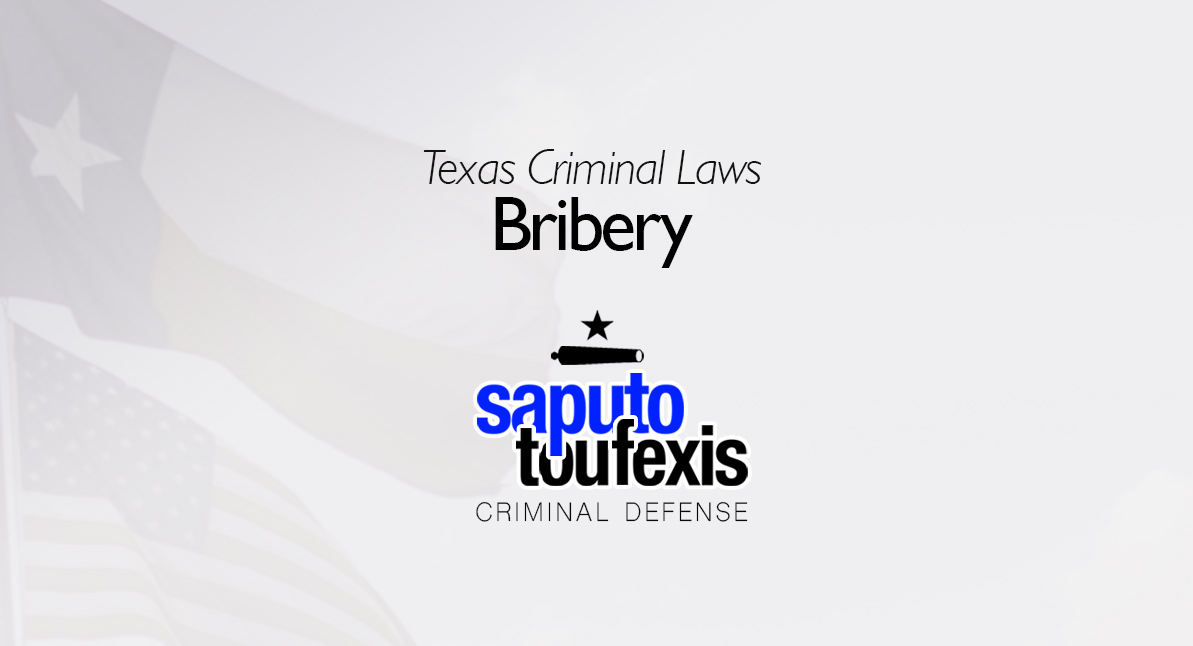The Texas Bribery law prohibits both the offering and receiving of money or any other benefit in exchange for a political vote, judicial decision or other official decision.
FAQs about the
Bribery law in Texas
Bribery is just one of the several white collar crimes related to public servants accepting cash, services, and favors. However, the Bribery law applies to both public servants and the public. It is a two-way law: both the payment and acceptance of bribes are prohibited. It even covers the mere offer itself. The legislature has not modified this law since 1994.
The Penal Code classifies the Texas Bribery law under Title 8 “Offenses Against Public Administration,” Chapter 36 “Bribery And Corrupt Influence.” Learn more about the Texas offense of Bribery below.
What is the current Texas law about Bribery?
Texas law currently defines the offense of Bribery in Penal Code Section §36.02 as follows:[1]
(a) A person commits an offense if he intentionally or knowingly offers, confers, or agrees to confer on another, or solicits, accepts, or agrees to accept from another:
(1) any benefit as consideration for the recipient’s decision, opinion, recommendation, vote, or other exercise of discretion as a public servant, party official, or voter;
(2) any benefit as consideration for the recipient’s decision, vote, recommendation, or other exercise of official discretion in a judicial or administrative proceeding;
(3) any benefit as consideration for a violation of a duty imposed by law on a public servant or party official; or
(4) any benefit that is a political contribution as defined by Title 15, Election Code, or that is an expenditure made and reported in accordance with Chapter 305, Government Code, if the benefit was offered, conferred, solicited, accepted, or agreed to pursuant to an express agreement to take or withhold a specific exercise of official discretion if such exercise of official discretion would not have been taken or withheld but for the benefit; notwithstanding any rule of evidence or jury instruction allowing factual inferences in the absence of certain evidence, direct evidence of the express agreement shall be required in any prosecution under this subdivision.
Interestingly, it is not a defense (and therefore still a crime) if the benefit was offered or received after the decision was made and even after the person is no longer a public official.[2] Political contributions (as defined by Title 15, Election Code, or an expenditure made and reported in accordance with Chapter 305, Government Code) are not considered bribes, however, if they comply with the law in the Election Code and Government Code.[3]
How can I be charged with a Bribery offense in Texas?
You can be charged with Bribery in Texas if the state’s attorneys believe that each of the elements of Bribery in any subsection, 36.02(a)(1), 36.02(a)(2), 36.02(a)(3), or 36.02(a)(4), as described in the section above have been met.
What is the statute of limitation for Bribery in Texas?
Bribery offenses have a three-year limitations period.[4]
What is the penalty for a Texas Bribery offense?
If you are convicted of Bribery in Texas, the offense is punished as a second degree Felony,[5] punishable by prison time of two to twenty years and a fine up to $10,000. Learn more about the difference between felonies and misdemeanors here
Can you get probation for Bribery in Texas?
The Texas Code of Criminal Procedure allows both judges and juries to grant probation for Bribery, and judges are also allowed to accept deferred adjudication plea deals.[6]
Note, however, that no matter the offense, neither judges nor juries may recommend community supervision for any suspended sentence of over 10 years.[7] Also, judges may not grant community supervision after a conviction if (1) the defendant used or exhibited a deadly weapon during the commission of the felony or immediate flight thereafter and (2) the defendant used or exhibited the deadly weapon himself or was a party to the offense and knew that a deadly weapon would be used or exhibited.[8]
What level of crime is Bribery in Texas?
The Penal Code classifies Bribery as second degree felony.
Learn more about the penalty range for this offense in the section above.
Legal References:
^1. Texas Penal Code §36.02. This law is current as of 2024.^2. Texas Penal Code §36.02(c)
(c) It is no defense to prosecution under this section that the benefit is not offered or conferred or that the benefit is not solicited or accepted until after:
(1) the decision, opinion, recommendation, vote, or other exercise of discretion has occurred; or
(2) the public servant ceases to be a public servant.
^3. Texas Penal Code §36.02(d)^4. See Code of Criminal Procedure 12.01(9)^5. Texas Penal Code §36.02(e)^6. See Chapter 42, Texas Code of Criminal Procedure, Art. 42A.054, Art. 42A.056, Art. 42A.102^7. Art. 42A.053(c), Texas Code of Criminal Procedure^8. Art. 42A.054(b), Texas Code of Criminal Procedure










